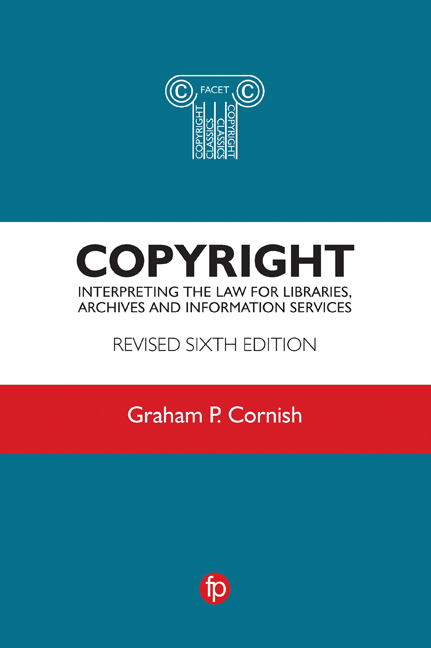Book contents
- Frontmatter
- Contents
- Author's note
- Acknowledgements
- List of abbreviations
- Introduction
- Section 1 Definition and law
- Section 2 What is covered by copyright?
- Section 3 Rights and limitations
- Section 4 Literary, dramatic and musical works
- Section 5 Artistic works
- Section 6 Sound recordings and performers’ rights
- Section 7 Films and videos
- Section 8 Broadcasts
- Section 9 Databases
- Section 10 Licensing schemes and licences
- Section 11 Computer programs, the electronic world and websites
- Section 12 Other matters
- Useful Addresses and Contacts
- Useful Sources of Information
- Appendix: suggested declaration forms
- Index
- Frontmatter
- Contents
- Author's note
- Acknowledgements
- List of abbreviations
- Introduction
- Section 1 Definition and law
- Section 2 What is covered by copyright?
- Section 3 Rights and limitations
- Section 4 Literary, dramatic and musical works
- Section 5 Artistic works
- Section 6 Sound recordings and performers’ rights
- Section 7 Films and videos
- Section 8 Broadcasts
- Section 9 Databases
- Section 10 Licensing schemes and licences
- Section 11 Computer programs, the electronic world and websites
- Section 12 Other matters
- Useful Addresses and Contacts
- Useful Sources of Information
- Appendix: suggested declaration forms
- Index
Summary
The 1988 Copyright Designs and Patents Act (CDPA) and the many subsequent statutory instruments (SIs) which interpret and modify it differ substantially from the Copyright Act, 1956. However, some aspects of this old Act still apply to some materials, as do some clauses of the 1911 Act, so they should not be ignored completely. Many definitions have changed and new rights have been introduced. Licensing as a concept is now also a major feature of information delivery but it was in its infancy in 1988.
Users are asked to note that some of the terms used in the Act are not ones that the author would choose to use. Particularly the term ‘disabled person’ is one that is controversial, but this is the term used in the law so it has been used throughout the book.
The introduction of new legislation often has the effect of heightening awareness of the subject, making people keener to know their rights and privileges and generally creating an atmosphere of extreme caution in case anyone puts a foot wrong and ends up in court. While this is a good thing, nobody should become too paranoid. Although there has been a recent tendency for copyright infringement cases to be heard in criminal courts, this is usually where important commercial considerations apply, such as republishing or reproduction in bulk for commercial purposes. Criminal proceedings may also be taken for circumventing or tampering with electronic rights management systems. Most infringements of copyright by individuals are dealt with through the civil courts, if events reach that stage, so that the rights owner must take legal proceedings if it is thought an infringement has taken place. As there are no cases at present involving libraries in the UK, it would be reasonable to assume that a similar route would be taken, given that libraries are not, or should not be, involved in mass reproduction for commercial gain!
The Act and its supplementary legislation also set the stage for a completely new approach to the use of copyright material. We may know what the law says (even if we do not always know what it means!) so there is now the necessity to develop services outside the exceptions which the Copyright Act makes by talking to the licensing agencies and other rights owners’ organisations to negotiate use of material in return for royalties.
Information
- Type
- Chapter
- Information
- CopyrightInterpreting the law for libraries, archives and information services, pp. xvii - xviiiPublisher: FacetPrint publication year: 2019
